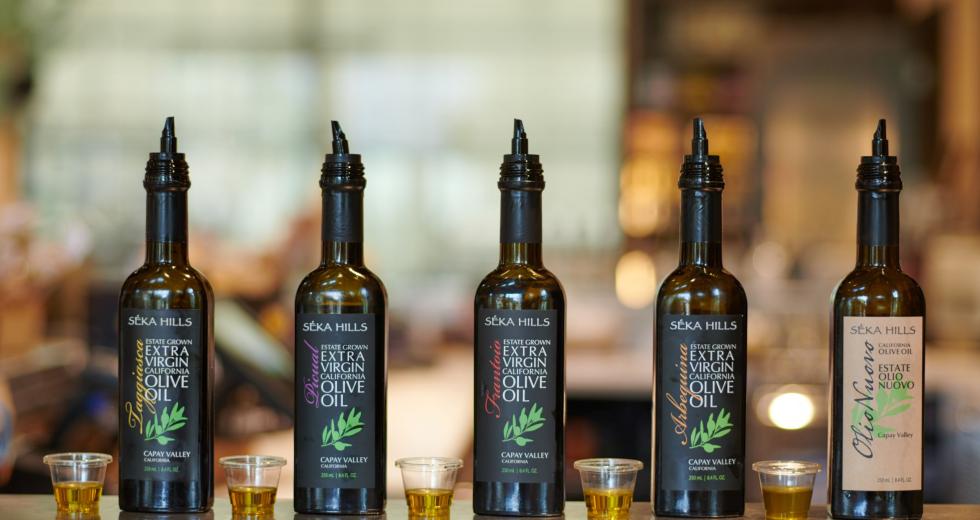Jim Etters looks out at the arbequina olive vineyard, still damp from the previous day’s rain. A two-belly container truck that had been fills with olives each day for weeks sat empty alongside the grove; the harvest halted for a day due to the wet conditions. Etters motions to the blue hills that were trying to peek out from behind a lingering shroud of gray clouds. When he came to Seka Hills in 2003, the land was mostly bare. Now there are 25,000 acres, with 520 acres of those acres devoted to groves of olive trees that produce premium quality olive oil sold throughout the western United States by the Yocha Dehe Wintun Nation.
“The western side of the Capay Valley is called the Blue Ridge, or the Blue Hills. That’s how we came up with our brand name,” says Etters, explaining Seka means blue in the tribe’s native Pawtin language. “The tribe really wanted a brand name that connected their language and their land.”
Among the 25,000 acres owned by the Yocha Dehe Wintun Nation,
about 520 are devoted to growing olive trees.
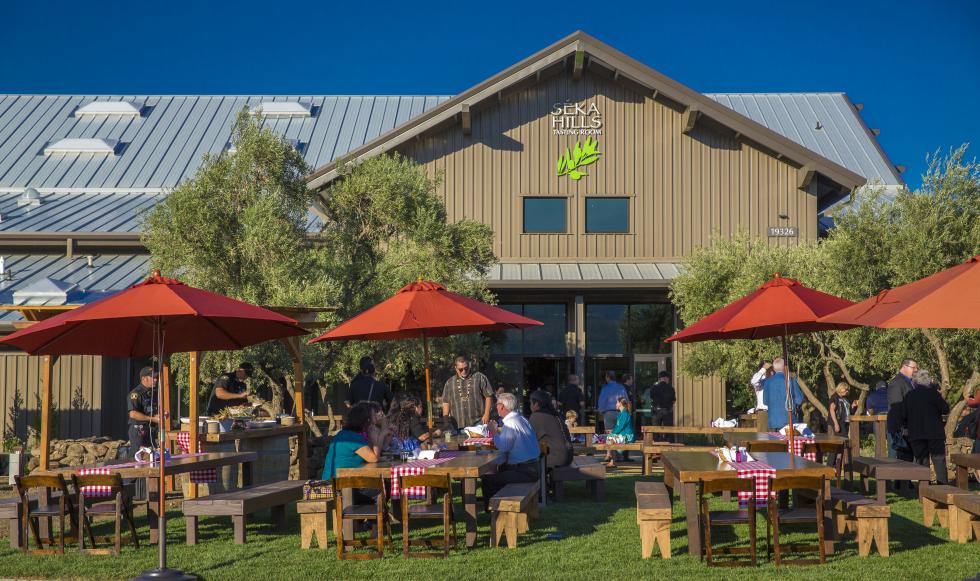
Those hills actually turn a blue hue when the sun shines on them. The olive oil produced by Seka Hills is used by more than 300 restaurants, from the famed Chez Panisse in Berkeley to Mulvaney’s Building & Loan in Sacramento, and sold in 700 specialty markets such as Whole Foods, Corti Brothers and Nugget Markets.
“Seka Hills oil has been a mainstay in our kitchen since we first tasted it. Consistently beautiful, you can taste the quality and the love that goes into it,” says chef Patrick Mulvaney, owner of Mulvaney’s B&L restaurant. “Seka Hills is the perfect example of what we mean when we say we live in the greatest growing region in the world, and we have the products to back that claim up.’’
Several varietals of olive oils are grown on the native land bought back from the government, including arbequina, koroneiki, picual, coratina, taggiasca and arbosana. Etters, the director of land management who has worked for the tribe for 19 years, doesn’t blend his varietals, wanting each olive’s distinct flavor profile to shine rather than be blended.
A building on the Seka Hills property features a tasting room,
gift shop and cafe.
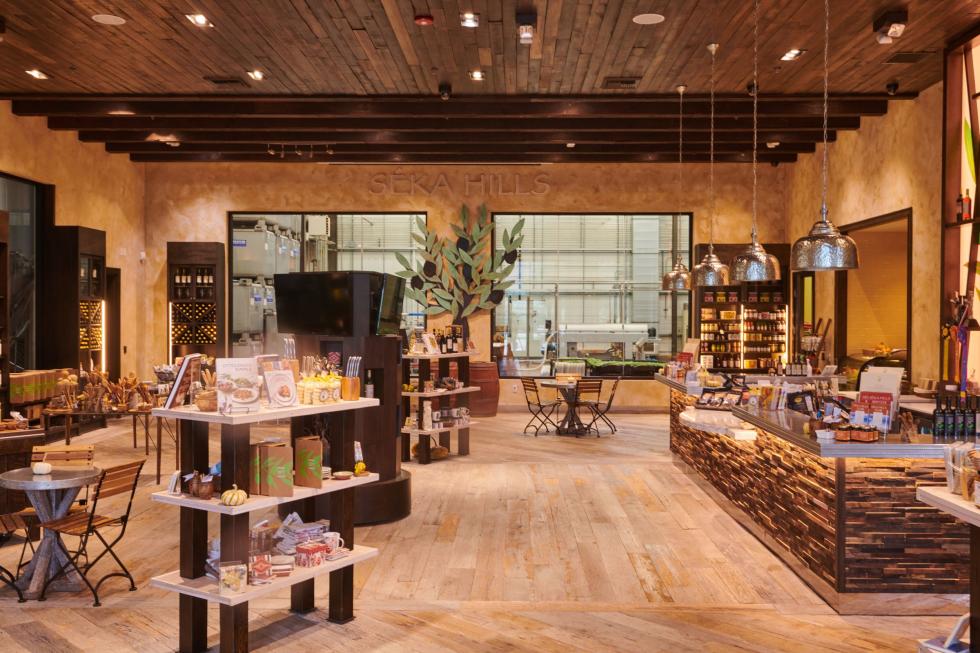
“You know, you wouldn’t use a very bitter and robust oil for sauteing. You wouldn’t finish a dish with a very mild and buttery oil, it may not lend itself well. So having each of those different kinds of flavors available to our customers has worked out well for us,” he says.
The first olive trees were planted in 2008 with the first harvest in 2011. Although there are also almond and walnut trees on the property, olives were chosen for growing because they’re drought tolerant, requiring one-third of the water the nut trees do, and with California’s increasingly dry seasons, they thrive in the hot Mediterranean climate that intensifies their flavor. The California Department of Agriculture and the California Olive Oil Council regularly tests the Seka Hills olive oil for its extra virgin status.
This year Seka Hills had a 10th anniversary celebration to celebrate its harvest, with tastings of the fresh, ripe olio nuovo along with food items. Seka Hills has grown impressively in the past decade. Located right down the road from the tribe’s successful Cache Creek Casino in the town of Brooks in northwest Yolo County, Seka Hills has a modern tasting room for its oils, balsamic vinegars and wines, which are also grown on the land. There’s a cafe for lunches made from locally-sourced food, including Seka Hills’ own organic vegetable crops, and a charming gift shop perfect for browsing for holiday gifts. There are also 800 head of cattle on the land which are used for their prime beef sales.
Located near the Cache Creek Casino and Yocha Dehe Golf Club,
also owned by the Yocha Dehe Wintun Nation, the Seka Hills
tasting room attracts visitors from around California.
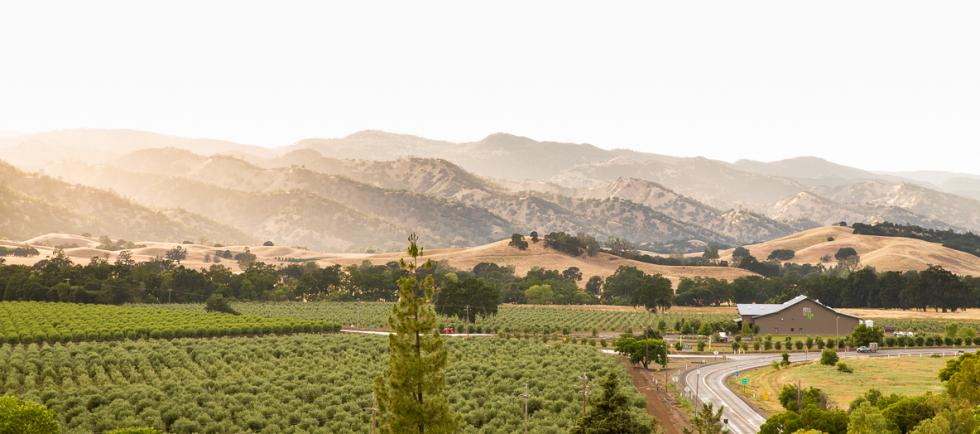
Etters also serves on the American Olive Oil Producers Association and the Olive Oil Commission of California. He says they are committed to producing the highest quality of olive oil. Seka Hills plants their olive trees in both the medium and super high-density style which produces a robust harvest in the fall. They use mechanical shakers to loosen the olives from the trees during harvest, which usually begins in October and wraps up right before Thanksgiving. (Etters says Seka Hills was the first to use the shaker machines in the U.S.) The olive oil is produced in a large Alfa Laval mill from Florence, Italy and stored in massive holding tanks that soar to the ceiling. The company’s goal is to produce 100,000 gallons per year. In 2021, it produced 60,000 gallons. Visitors can taste all the varieties in the adjacent tasting room.
“I love using Seka Hills oil because it tastes of the land where it grows. And it makes everything it touches taste better,” Mulvaney says. “Seka Hills has become our first choice for quality oil in our kitchen, though we understand Italy, Greece and Spain make some that is almost as good.”
The Yocha Dehe Wintun Nation has lived in the Capay Valley for thousands of years. In the early 1900s, the federal government forced them to live on a reservation. In the 1980s, some of their land was returned, and as the tribe began an Indian gaming operation, they were able to acquire more land. The tribe’s holdings now include Cache Creek, Seka Hills and the Yocha Dehe Golf Club.
“This land is very special to the tribe, very special,” Etters says. “The tribal land is what sustained them here in the Capay Valley for thousands of years. This is their historical landmark.”
–
Stay up to date on business in the Capital Region: Subscribe to the Comstock’s newsletter today.
Recommended For You
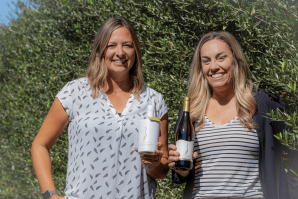
Olive and Wine Tasting Go Hand-in-Hand at Calivirgin in Lodi
New facility helps longtime olive oil business expand into wine
Lodi-based, family-owned Calivirgin has reshaped its
business. Part of California’s rich olive oil landscape for
almost two decades, its new facility allows the owners to
showcase award-winning products, introduce a new wine
line and host tastings.
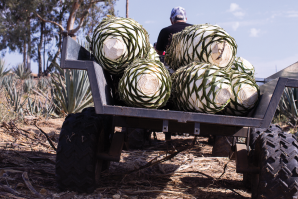
Could Agave Spirits Be a Sustainable Gold Rush for California?
Hardy plants could solve water crisis for farmers and give distilleries a big opportunity
Northern California’s agave pioneers are helping to evolve the crop from a novelty to a force of stability within California’s changing bread basket.

A Cooperative Spirit
Remembering 1972 and 50 years for Davis and Sacramento food co-ops
Both the Davis and Sacramento food co-ops have expanded
exponentially since their inception in the early 1970s, when they
primarily served ”the hippie population.” Fifty years
later, has the spirit of 1972 held up?
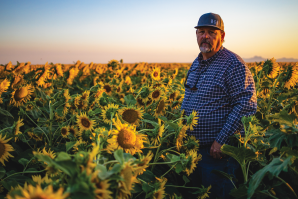
The Seeds of Conflict
How the Russian invasion of Ukraine and drought are affecting sunflower farmers in Yolo County
Yolo County’s most photogenic crop is facing a barrage of challenges, including supply issues related to the war in Ukraine, global currency volatility and drought.
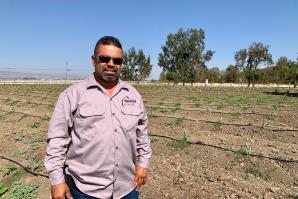
Visions of Agave, Plans for the Future
A Jalisco-born roofing contractor gets into agave in Solano County
Carlos Rodriguez found a piece of the California dream by taking inspiration from his childhood in Mexico. He recently planted 2,000 agave crops on his land in Vacaville, which he’ll eventually use to propel the state’s newest movement in craft spirits.
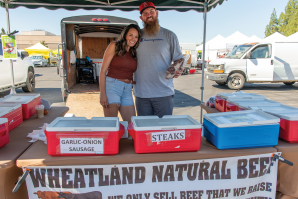
Inflation Hits the Market Basket
How price increases are affecting the micro-economy of farmers markets
In a year of rising costs, farmers have quality as an
advantage. Still, farmers market vendors and shoppers are
struggling to stretch their dollars.



